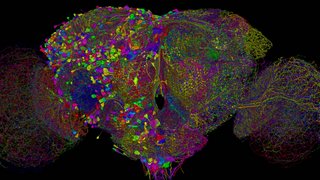The brain, and how it coordinates and controls the body, remains a fundamental research problem in neuroscience. To support research in this area, the US National Science Foundation (NSF) together with federal funding agencies from Canada (CIHR, FRQC), the UK (MRC) and Germany (German Science Foundation; DFG) created the programme Next Generation Networks for Neuroscience (NeuroNex). NeuroNex will build on latest global developments in neurotechnologies to address several overarching questions in neuroscience. Globally, only four consortia were approved for a funding period of five years. Each consortium will receive funding of up to 10 Mio. USD (9 Mio. euros).
Alexander Blanke (ERC Starting-Grant awardée), Kei Ito (Axa Chair of Research) and Ansgar Büschges, all Institute of Zoology at the University of Cologne, were selected for one of these four research consortia together with thirteen other colleagues from Germany, the UK and the USA. Support for the UoC researchers for the first three years amounts to approximately 1.2 Mio. euros.
The project, titled ‘NeuroNex: Communication, Coordination, and Control in Neuromechanical Systems (C3NS)’ looks at how the nervous system in animals across a range of sizes, body forms and locomotion types coordinate and control interactions with the environment. Research will focus in particular on mammals (mouse/rat), insects (fruit fly) and molluscs (sea slug). Despite their apparent differences, all these animals have to interact with the same physical world. They also derive from the same ancestral origin back in the pre-Cambrian period, sharing many common ground plans in their nervous systems. By understanding the fundamentals of biological control and actuation, Blanke, Büschges, and Ito aim to provide insights into the biomechanics and neurobiology of locomotion that will serve to develop better control architectures for robots.
Alexander Blanke is an expert in the biomechanics of insects. Together with C3NS colleagues, his team will study the mechanics of sensory systems in the fruit fly in order to understand how mechanical stress translates into neuronal feedback.
Ansgar Büschges is an expert in neurobiology for neural networks and mechanisms underlying animal locomotion. For C3NS his working group will identify properties, role and processing of sensory feedback from the legs in the fruit fly ventral nerve cord including the interaction with pathways to and from the brain.
Kei Ito is an expert in neuroanatomy; having just established more than 4,000 neuron types out of the total 5,229 types that make up the whole fruit fly brain. For C3NS his team will identify the brain neurons that receive sensory input and modulate motor output during locomotion and analyze their functions.
‘This is a unique chance for us to make a leap forward in our understanding of brain-body interactions’, says Büschges, who has cooperated with lead principal investigator Roger Quinn of Case Western Reserve University in the United States for several years now. The German part of C3NS will start in early 2021.
Media Contact:
Professor Dr. Ansgar Büschges
+49 221 470-2607
ansgar.bueschgesuni-koeln.de
Professor Dr. Kei Ito
+49 221 470-5617
k.itouni-koeln.de
Dr. Alexander Blanke
+49 221 470-76128
a.blankeuni-koeln.de
Press and Communications Team:
Sarah Brender
+49 221 470-1700
s.brenderverw.uni-koeln.de
Further information:
NeuroNex: Communication, Coordination and Control in Neuromechanical Systems (C3NS)
Group Prof. Dr. Kei Ito
Group Prof. Dr. Ansgar Büschges
Institute for Zoology
